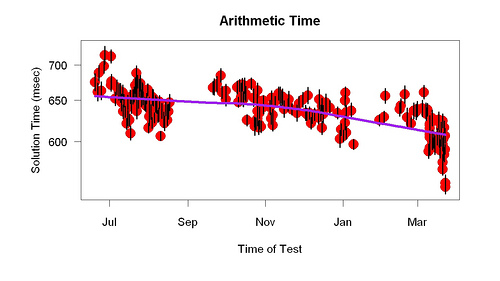Measuring Cognitive Function – New Results
Gary Wolf
March 29, 2010
 At QS Show&Tell #12 Seth Roberts quickly showed some of his latest results from his fascinating cognition experiments. We will have video of Seth’s talk up soon, but in the meantime I wanted to link to some additional explanation Seth has posted on his blog.
At QS Show&Tell #12 Seth Roberts quickly showed some of his latest results from his fascinating cognition experiments. We will have video of Seth’s talk up soon, but in the meantime I wanted to link to some additional explanation Seth has posted on his blog.
First, some background. At QS Show&Tell #2, Tim Lundeen described how he was using simple arithmetic problems to test his cognition. Lundeen used this method to explore of Seth’s ideas about flax seed oil. Lundeen found that 80mg of flax seed oil per day made him smarter.
Seth took up the “simple arithmetic” assay and tried his own version. He reported the results here.
Recently, Seth noticed mysterious improvement in his scores, and at the recent Show&Tell he shared his conclusion that eating butter makes his brain work better.
During the question period, I asked Seth to explain why he felt that simple arithmetic tests were a good proxy for overall mental functioning. He answered briefly at the meeting, but has followed up with a longer post.
At the latest Quantified Self Meetup, I described my
recent arithmetic results. Gary Wolf asked why I used arithmetic to
measure brain function.The simplest answer is that it won a competition. I tried eight or so
different ways of measuring brain function and it was the best. I had
high hopes for all of the tests and spent a lot of time on most of them.
I hoped to find a test that was as fun as playing a game yet provided
the detailed and controlled info of a typical cognitive psychology task.
I didn’t quite get there.
The winning approach, Seth reports, had a shorter learning curve, was more portable, and had many other benefits. You can read more about it here.
I am still curious about this topic. A good proxy for overall brain function is a valuable tool of self-assessment.


